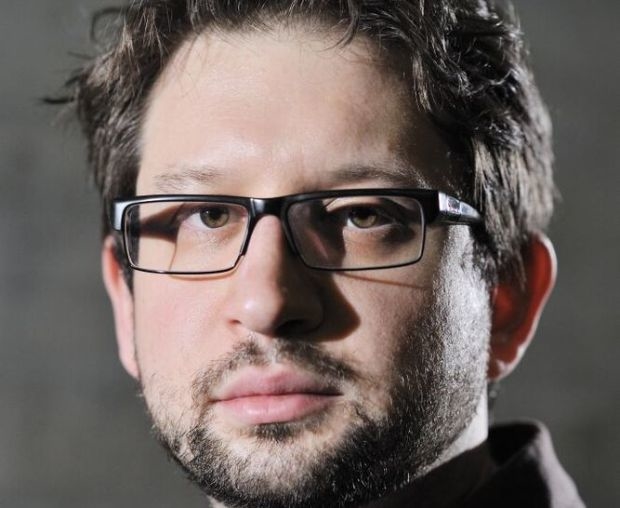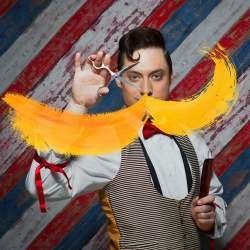Sam Brown – 'the lens of interpretation'
The director of WNO’s ”The Barber of Seville” on heroes, chair-throwers and opera in English

© Jochen Klenk
The spring season at Welsh National Opera has the umbrella title Figaro Forever, with the two most celebrated operas about Beaumarchais’ streetwise fixer, The Barber of Seville and The Marriage of Figaro, joined by a new commission from the UK-based Russian composer, Elena Langer, whom the company has invited to complete the trilogy with Figaro Gets a Divorce.
All three operas will open in Cardiff during February, then tour extensively. They’re being done chronologically, so first out of the blocks is Rossini’s Barber. Its director, Sam Brown, spoke to WhatsOnStage.
What special considerations do you have to bear in mind when directing for a range of tour venues?
The responsibility of the show on tour falls to the staff director, and having performed this role for Opera North over two seasons I know that job quite well. Many of the touring venues differ, and so I try to ensure in rehearsal that what works in Cardiff should work elsewhere; but there have to be small adjustments from town to town. Fortunately WNO has a wonderful staff director and the show will be in very good hands.
Does the prospect of having Andrew Shore in his signature role as Dr Bartolo daunt or inspire you?
A little of both! Andrew Shore is one of the leading performers of this role not only in the UK but across the world. I worked with Andrew first at ENO when we did Jakob Lenz by Rihm together – quite a different piece! When I was commissioned to do this Barber I immediately proposed him as Bartolo. Fortunately David Pountney [artistic director of WNO] shared my high opinion of him.
What’s the difference between directing for theatre and for opera?
The main thing I think is about the relationship of music. First there's the conductor, with whom I have to collaborate during rehearsals. He (unfortunately it usually is a he) must perform the piece each time with the singers, whereas I’m able to leave after the first night. But we create it together. I always try to meet with the conductor to go through the whole piece on the piano several months before rehearsals begin because for me the music is the starting place. But, as I trained in the theatre, the text – what it means and what the characters want – is also crucial. Especially when singing in English as we are doing in this production.
What drew you to opera?
Christine Chibnall at Opera North had seen my work for West Yorkshire Playhouse and invited me to become an assistant director there. Prior to that I had very little knowledge or experience of opera, but I started to immerse myself in it. I fell in love with the art form and at Opera North I had an incredible education, working on a huge variety of pieces from Don Carlos to Ruddigore to Pique Dame. As a director I've worked across genres, from comedy and operetta to contemporary opera and bel canto.

What attracted you to this Barber of Seville for WNO?
The invitation to work with designer Ralph Kotai was a huge factor in my agreeing. Ralph is a giant of the theatre – an artist of genius who changed the way we think about scenic design. His influence is enormous. To work with him on a new production was an honour and I’ve enjoyed every minute of it. Even though he is now 90 he has a spectacular energy and rigour in his approach to design and it's been a wonderful experience.
An opera director is restricted by bar lines on the page. Are these a blessing or a curse?
Sometimes they feel like a curse, but ultimately I think they're a blessing because as a director I’m forced to mould my ideas around them. And for me they’re the beginning, the middle and the end of all my work. The music provides me with the inspiration; when you’re stuck the answer is normally there. Music is a language all of itself, and great singers know how to interpret it to serve the scene. Good directors should use their scenes to serve the music – to tell the story of the musical score – and ultimately (and I think this is basically the job of the opera director) to present it to the audience through the lens of their interpretation.
Who are your role models?
There are many! But the directors whose work I really admire are Richard Jones, Graham Vick and Peter Konwitschny. What these three directors share is not only imagination but a way of interpreting a well-known opera as if it were newly minted, even to the most experienced opera-lover.
How far is the text sacrosanct for you?
It depends on the piece. In operetta I tend to re-write the dialogue a lot to get me from number to number; that’s because, in Viennese operetta especially, the text is just linking between numbers. But the text of the music I always leave in place. I think if you have to change the text you’re chickening out.
In a translation, however, you have the opportunity to heighten the comedy or the tragedy. I’m a great believer in opera in English – especially for comedy – because there is no experience quite like that of listening to this music in your own language and not having to rely on subtitling to understand. With a translation, one has the opportunity to mould the piece a little – and there’s nothing wrong with that because any translation is an act of interpretation. I recently did My Fair Lady in German – unimaginable for most of your readers I’d guess, but something that provided a huge pleasure to the audience, to hear this music in their own language.
When inspiration has flagged have you ever directed your singers to throw a chair?
Haha – yes, in Jakob Lenz, but to be fair to myself (and to Andrew Shore who was the chair-thrower in question), the character was completely mad, and it was a rather special effect, given that it landed in a pool of water. You’ll be happy to know there isn’t any chair-throwing in The Barber of Seville!
Sam Brown's production of The Barber of Seville runs in repertory at the Wales Millennium Centre from 13-25 February, then tours to Birmingham, Llandudno, Bristol, Southampton, Milton Keynes and Plymouth until 8 April.












